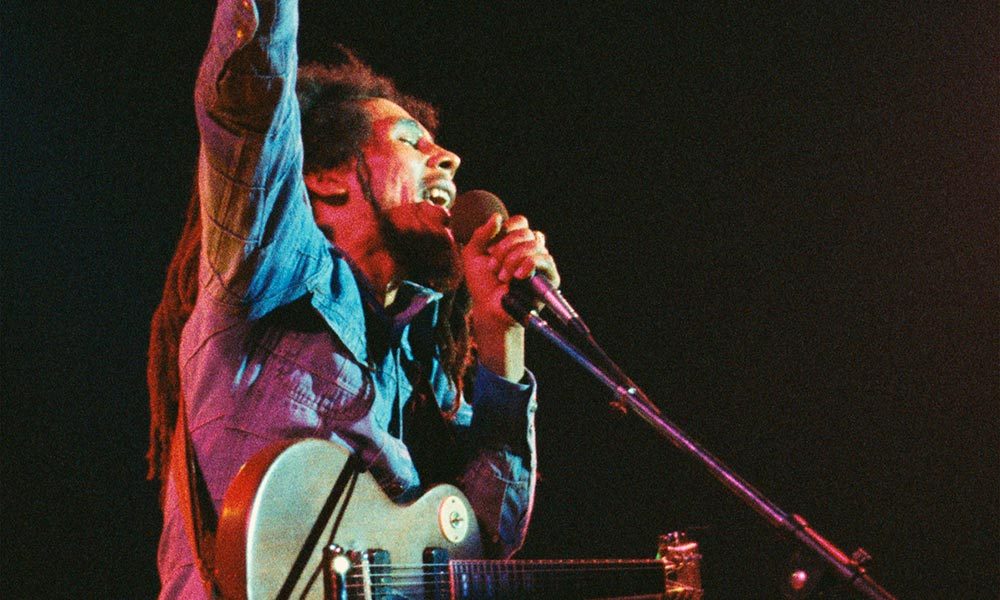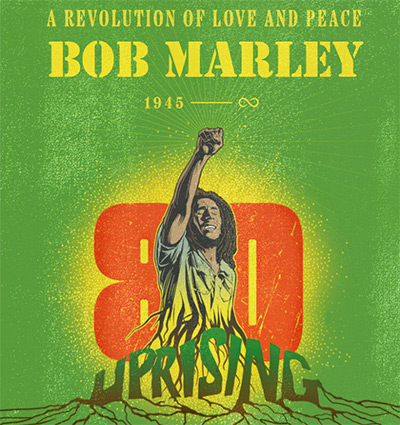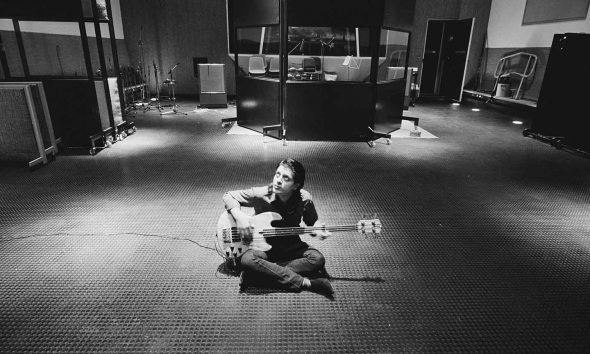One Love, One Bob Marley: The Life And Legacy Of Jamaica’s Biggest Star
In taking reggae to the world, Bob Marley put Jamaica on the map. His legacy reaches beyond music, spreading messages of love and unity.

A face adorning a million student halls. The rebel with a spliff. That guy who told us every little thing is gonna be alright. The fella who prompted people the world over to grow dreads, including Dutch football legend Ruud Gullit, and who was handy with the ball himself. An icon for the so-called third world. A sexy dude with a twinkle in his eye. The first Caribbean rock star. A legend. Which one was Bob Marley? All of them. And more.
Each year, we celebrate Bob on his birthday, not on the day he passed away. Because in all but the most inevitable of senses, Bob Marley remains very much alive. His music continues to resonate. His work, telling of the tribulations of his people in Jamaica and seeking to uplift those with African roots (which is, according to anthropologists, everyone) goes on. His physical presence may be gone, but, as his fellow reggae star Toots Hibbert paid tribute on record, “His Songs Live On.”
Listen to the best Bob Marley songs on Apple Music and Spotify.
More than this, Bob’s image also lives, adorning products worldwide. Tuff Gong, the record company he founded in the early 70s, when, along with fellow Wailers Peter Tosh and Bunny Wailer, he sought artistic and financial independence, is a major player in Jamaican music. Marley is more than a singer; he is a symbol of hope and fulfilment worldwide. You may be hungry and poor – and Robert Marley was born as poor as you could get – but if you were true and striving and had something to say, you could be heard. Bob reached an audience beyond his imagining, and in his wake, other reggae singers were suddenly taken seriously.
Bob Marley may have been a leader, but he did not see himself as a messiah. He was just carrying out “the works,” he said, bringing the message of Rastafari to the world. It was a duty, not a vanity. It was about doing the right thing. On songs such as “War,” “Exodus,” “Get Up, Stand Up” (co-written with Peter Tosh), “One Love,” “Natty Dread,” and numerous others, Bob took his message to the world. But the chances of him being able to do it with such success were infinitesimal. If society’s usual values are applied, Bob was meant to be one of life’s losers.
Birth of The Wailers
Bob Marley was born in the small country settlement of Nine Mile, in St Ann, Jamaica, on February 6, 1945. His father, Norval, originally from the UK, was absent, though he did send some money to Marley’s mother, Cedella. Norval died when Bob was ten; practically penniless, Cedella headed south for Jamaica’s capital, Kingston, ending up in Trenchtown, a slum district but a wellspring of sporting, political and cultural talent. The young Bob loved music, especially US musicians such as The Impressions, The Miracles, and The Moonglows. He had a decent voice and, in 1962, recorded some songs for Leslie Kong, owner of Beverley’s records in Kingston’s Federal studios. Three were released as singles on the fledgling Island label in the UK, credited to Robert Marley.
The singles flopped, but, undaunted, Bob formed a vocal group with fellow teenagers in the government yard in Trenchtown, Bunny Livingston and Peter Tosh, plus a revolving cast that included Junior Braithwaite, Constantine “Vision” Walker, and female vocalists Beverley Kelso and Cherry Smith. Walker also worked with The Soulettes, a vocal outfit whose leader, Rita Anderson, would become Bob’s wife and musical foil. Bob’s group’s name eventually settled as The Wailers. Under the tutelage of local star Joe Higgs, they absorbed the finer points of harmony singing, and he took them to Studio One in 1964, where they cut a series of ska hits, including “Simmer Down,” “It Hurts To Be Alone,” “Rude Boy,” “Put It On,” and “One Love,” most written by Bob, though the group’s lead vocalist role rotated. Often basing their harmonies on The Impressions, albeit with a Jamaican beat, they sang of love, folklore, and rude-boy antics. The Wailers were teen stars across the island, but received little renumeration.
Gritty and rebellious
Stripped to a core of Bob, Bunny and Peter, in 1966 the group formed their own record label, Wail ’N Soul ’M, partly funded by Bob’s stint on a Chrysler production line in the US. The Wailers’ company released a series of superb, often serious records in the rocksteady style, but only two sold strongly, the suggestive “Bend Down Low” and the romantic dance invitation, “Nice Time.” Any income was absorbed by studio and session charges, and pressing and distribution costs: the group remained, in the Jamaican word, sufferers. Bob’s interest in Rastafarianism was confirmed in April 1966, however, when his wife, Rita, witnessed the visit to Jamaica of the faith’s living God, His Imperial Majesty Emperor Haile Selassie Of Ethiopia. Bob was instructed in his new spirituality by Ras Mortimer Planno, the religious teacher who greeted HIM at the airport.
Bob returned to Beverley’s with The Wailers in 1969, but Leslie Kong’s successful upbeat sound did not suit the group. In 1970, a union with maverick producer Lee “Scratch” Perry proved more fitting. He identified a rebellious tendency in the group and encouraged it, revealing a swelling militancy across two albums, Soul Rebels and Soul Revolution. Scratch urged Bob to sing in a more emphatic manner and helped them sound more rootsy. Several songs that would fuel Bob’s mid-70s rise debuted under Scratch’s regime, including “Small Axe” and “Sun Is Shining.”
The Wailers left Scratch, taking Aston “Family Man” and Carlton Barrett, Perry’s bass and drums brothers, with them. They again focused on their own label, renamed Tuff Gong. Bob flew to Europe to write for US star Johnny Nash, then met Chris Blackwell, who asked The Wailers to create an album for his label, Island. Catch A Fire (1973), was gritty and rebellious, yet built to appeal to the era’s rock culture. A further album, Burnin’, was, naturally, just as hot. When Eric Clapton, regarded as the most serious rock musician of the era, had a US No.1 with Bob’s “I Shot The Sheriff” in 1974, Bob’s stock rose further. Live!, which found him and The Wailers in celebratory form at London’s Lyceum Theatre, delivered a major 1975 hit in “No Woman, No Cry.” But this Wailers was a backing band: Peter and Bunny had quit before 1974’s seminal Natty Dread album. Bob’s wife, Rita, and established reggae vocalists Marcia Griffiths and Judy Mowatt handled the harmonies as The I-Threes.
One love
Island marketed Bob Marley & The Wailers like it promoted its rock acts. Bob’s dreadlocked image helped, and the seriousness of his message destroyed a lingering idea among some critics that reggae was trivial. In Jamaica, Bob was important enough to face a gunman’s assassination attempt in December 1976. The motive remains unclear, but one theory suggests political factionalism in Jamaica turned its fury on Bob when he agreed to appear at the Smile Jamaica concert organized by the Prime Minister. Bob, wounded in the arm and chest, played the gig just two days later.
Brave he may have been, but Bob was not reckless. He chose to recover somewhere safer, and flew to London. The move affected his music positively, resulting in the 1977 album Exodus, which enjoyed more than a year on the UK charts and carried the hits “Jamming,” “Waiting In Vain,” “Three Little Birds,” and “One Love”/”People Get Ready.” Time later named it the album of the 20th Century. Bob also cut the successful Kaya in the UK. In April 1978, he faced down danger to unite the leaders of Jamaica’s antagonistic parties at Kingston’s One Love Peace Concert, forcing the politicians to clasp hands while he sang “Jamming.” Bob’s will could not be denied.
Bob’s progress continued unabated, with the serious Survival and Uprising albums delivering contrasting classics, “Redemption Song” and the anthem-like “Zimbabwe,” the latter of which was written in 1979 and gloriously performed in Harare on 17 April 1980, at the African country’s independence celebrations. However, Bob was secretly seriously ill. He’d been diagnosed with cancer in 1977, and the disease became critical when he collapsed in Central Park, NYC, two days before his final gig, in Pittsburgh, on 23 September 1980.
Bob left Earth to do his work in the next realm on 11 May 1981. He was 36. Jamaica gave this child of the ghetto, a true believer in a religion the island’s middle-class rejected, a full state funeral. He had done more for the country and its sufferers than any number of official schemes.
In the decades that followed, Bob’s legacy has been carefully handled. For years, his music has never appeared on inappropriate compilations, and official collections, such as Rebel Music, Songs Of Freedom, and the perennially popular Legend, pay respectful tribute to his work and message. Some fans assume that Bob is still a physical presence, so eternally contemporary is his message of unity, spirituality, and freedom.
His work goes on. One love, one heart. One Bob Marley.














